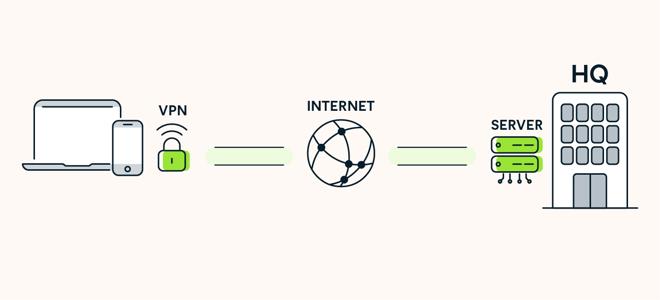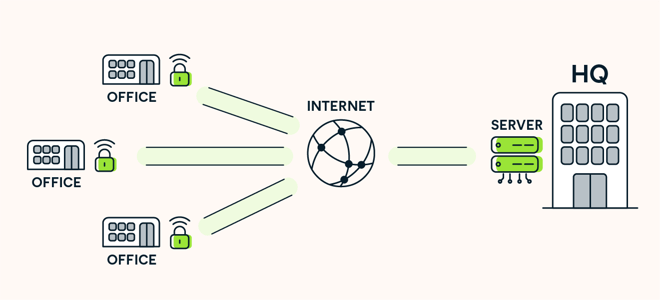What is VPN ?
What is a VPN and what does it mean?
VPN stands for "virtual private network" — a service that helps you stay private online. A VPN establishes a secure, encrypted connection between your computer and the internet, providing a private tunnel for your data and communications while you use public networks.
How do VPNs work?
The Virtual Private Network was first developed by Microsoft in 1996 as a way for remote employees to securely access the company’s internal network. Once it doubled company productivity, other companies began to adopt the practice. Corporate VPNs that allow remote work are now a standard feature of the global business landscape.
Developers then realized that this secure “tunnel” could be utilized by average people who wanted to securely connect to the largest network on the planet: the world wide web. VPNs are now the cornerstone of online privacy in the consumer sector.
Different types of VPN
There are two basic types of VPNs. A remote-access VPN allows users to connect to another network, be it the internet or their company’s internal system, through a private encryption tunnel.

The other type, a site-to-site VPN, is also called a router-to-router VPN. This type of VPN is mostly used within corporate environments, specifically when an enterprise has headquarters in several different locations. The site-to-site VPN creates a closed, internal network where the various locations can all connect with each other. This is known as an intranet.

There are several VPN protocols or methods of security. The oldest is PPTP, a point-to-point tunneling protocol, which is still in use today but widely considered one of the least secure. Others are IKEv2, L2TP/IPSec, SSL, TLS, SSH, and OpenVPN. As an open-source protocol, OpenVPN is amongst the most secure because any vulnerabilities in its programming will quickly be noticed and patched.
Why use a VPN?
Do you really need a VPN? Short answer: yes. There are several important reasons why you need a VPN, the two main purposes being privacy and access.
Public Wi-Fi networks, such as those found in coffee shops, airports, and other public areas are incredibly risky. All it takes is one hacker connected to the same network, and they can easily spy on all your activity. A VPN acts like an invisibility cloak, hiding everything you do on your phone or computer.
And why use a VPN at home? VPNs also allow you to hide from your internet service provider (ISP), governments, and advertisers… so you can avoid censorship, price discrimination, and geo-blocks on media.
In 2017, the US abandoned net neutrality — the principle that ISPs should treat all internet data equally — and various lawsuits continue over the issue. The complete elimination of net neutrality would free ISPs to collect and sell your personal data, including your browsing history, physical location, health info, and even your social security number. It would also permit ISPs to slow down your connection if you do a lot of downloading and streaming, and otherwise discriminate against certain internet users. A VPN blocks your ISP from seeing your browsing history and other personal data.
Additional benefits of a VPN
Stream from anywhere: If you’re abroad and you try to access a streaming account you use in the US, you may find some shows are not available in that region. But if you choose a US-based IP address, all your favorites are at your fingertips, just as if you were home.
Access blocked websites: Certain institutions — schools, libraries, companies — restrict access to specific web pages such as social media, but the encrypted connection provided by your VPN will tunnel right through.
Avoid censorship: Every government has an agenda, and some go to extremes to control information. While circumventing government restrictions could certainly be considered illegal in some of these countries, we believe in unadulterated free speech.
Beat price discrimination: Price discrimination can hit you in two ways. One is by your location — people in San Francisco or New York have a higher cost of living and therefore higher incomes. Clever businesses know this and program their sites to display a higher cost of goods, such as airline tickets, to users based in those areas.
The other way you can experience price discrimination results from your ISP tracking your purchases and preferences. As it learns you regularly buy a specific product, it can sell the product manufacturer your info, and you may see that product’s price go up for you because they know you’re going to buy it. The privacy and anonymity of a VPN keep you free of this kind of targeting.
Don’t be tracked: It bears repeating as its own section — don’t let yourself be tracked by hackers, cybercriminals, corporations, the government, or even your own ISP. Keep yourself free from repression, targeting, and discrimination.
Avast SecureLine VPN will make your connection secure, no matter if you’re at home or on public Wi-Fi. Use our VPN on all your devices to get real digital privacy. Access blocked websites, avoid price discrimination, and keep your private matters private.


